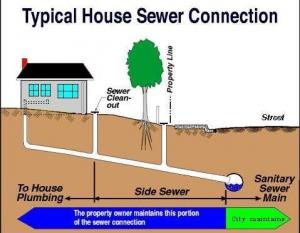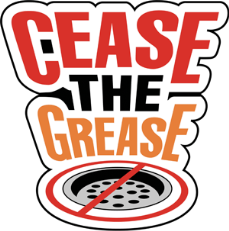Sewer Backup Policy
General Information
A sewer backup creates a stressful and emotional situation for the homeowner/renter. In some cases it may cause health and safety concerns as well as significant property loss. A proper response to a sewer backup can greatly minimize property damage and diminish the threat of illness.
The City of Mills makes every effort to be responsive to a residence needs and concerns when a sewer backup occurs. As with many other municipalities, the City cannot assume full financial responsibility for damages resulting from sewage backups or water damages. The City has a sewer crew whose duty is to inspect, clean and maintain sewers on a regular basis. They are available on 7-day a week, 24-hour a day basis to minimize the possibility of sewer problems. Unfortunately, because a sewer is not a closed secured system, many things put into the sewer can clog the system. Large amounts of grease from restaurants and disposable (and cloth) diapers are two common items that that cause problems. While the City of Mills has adopted rules prohibiting the discharge of any substance likely to cause a sewer obstruction and tries to educate the public about the problems they cause, it is a reality that these events happen and they are not always preventable. Other factors can cause backups as well, such as tree roots, which can grow into and obstruct the system.
Many homeowners’ insurance policies exclude damage resulting from sewer backups. However, some insurance companies do provide sewer backup coverage. In the majority of cases, a special rider will need to be added to you homeowner’s or renter’s insurance policy to cover damages related to sewage backups or water damage. If you are concerned about the possibility of a sewer backup and want to insure that you are covered, the City urges you to check with your home insurer regarding the availability of sewer backup insurance.
Contact Information
If you are experiencing a sewer problem, please call the Mills City Hall at 307-234-6679 or the Public Works Department at 307-265-1821. For emergencies please call the Police Department dispatch at 307-266-4796 and state that you are reporting a sewer emergency or a water line leak. Backed up sewer lines, waterline breaks, sewer odors and overflowing manholes are considered an emergency.
If the problem is in the sewer lateral, the homeowner or business is responsible for correcting the problem. The owner of the property is responsible for maintaining and cleaning the sewer lateral from the building (or home) to the City’s sewer main, including the connection on the sewer main. Locating the lateral is also the responsibility of the property owner. Plumbing companies have special locating equipment which will be helpful.
If a problem is in the sewer lateral, whom do you call for help? You will need to call a plumber or a sewer/drain cleaning service. Check your Yellow Pages or Business White Pages for the qualified businesses that specialize in this type of cleanup. The City of Mills does not make recommendations. It may be in your best interest to obtain several estimates. To minimize damage and negative health effects, the owner/renter should arrange for cleanup of the property as soon as possible.
REMEMBER TO CALL THE MILLS CITY HALL FIRST before calling a plumber. We will check the sewer main and inform you of our findings. If the problem is not in the City main, you will need to contact a plumber/drain cleaning service.
LATERAL vs. MAIN
What is a sewer lateral? A sewer lateral or house lateral is the pipeline between the City sanitary sewer main, usually located in the street, and the building. The sewer lateral is owned and maintained by the property owner including any part, which may extend into the street or public right of way.
More often than not, the cause of a backup in your lateral is from items that the line is not meant to handle, such as toys, underwear, towels, diapers and paper products (other than toilet paper). What you flush down your toilet may not affect only you, but might cause problems for your neighbors as well! Another possible cause would be roots in your lateral. The lateral is the responsibility of the owner of the property from the house to the sewer main.

Ways to Prevent Backups in your Lateral and in the City Main:
The property owner can do many things to prevent their lateral and the City Main from backing up. If everyone would be careful about how they dispose of certain products, our systems would be a great deal more efficient, cause fewer backups, cost us all less money, and prevent a lot of misery.
WHAT NOT TO FLUSH:
Down the toilet or down the line isn’t the end of the line. When you flush the water and unmentionables they go somewhere. Most homes, businesses, and industries in Mills are connected to a sewer that conveys flushed and drained wastewater to the Casper wastewater treatment plant prior to being released cleanly and safely into the environment. Some things should never be flushed or sent down the drain because they cause problems, Do not use your toilet as a trash can!
Things that should never be flushed or drained include:
• Paints and Solvents
• Gasoline or Combustible Fuels
• Toxic Chemicals
• Antifreeze
• Medicines and Pharmaceuticals
• Paper Towels
• Cloth or Disposable Diapers
• Baby Wipes
• Feminine Products
• Needles or Razor Blades
• Large Amounts of Food Waste through the Disposal
• Fats Oils and Grease (FOG)
The most common cause of sewer plugging is caused by FOG. Grease and oil comes from cooking, meat fats, lard, oil, shortening, butter, margarine, food scraps, baked goods, sauces, and dairy products. If they are sent down the sink drain they stick to the surface of drain piping and sewer lines. They eventually build up to the point of full plugging and then raw sewage can backup into your home or overflow into the street. You can help prevent this most unpleasant situation.
• Never pour grease down a drain or into a toilet
• Put baskets/strainers in sink drains to catch food scraps and other solids then empty them into the trash can
• Scrape grease and food scraps into a trash can and avoid sending them down the drain or food disposal
• Restaurants should all have approved and maintained grease traps
Disposal units do not keep grease out of sewers. Hot water and detergents that dissolve grease do not prevent a problem; they only move the problem down the system.

ROOTS AND PIPE JOINTS:
Over the years, sewer pipe has been made from various materials such as Orangeburg and clay tile or PVC (polyvinyl chloride). Orangeburg and clay tile are brittle and more prone to intrusion from roots at their joints. PVC pipe is made from long lasting, durable plastic material that uses water tight seals at every joint and is more resistant to root intrusion. Shrubs and trees, seeking moisture, will make their way into sewer line cracks and pipe joints. These roots can cause extensive damage. They may start out small, getting into a small crack in the pipe; but as the tree or shrub counties to grow, so does the root. After time, this causes your sewer line to break, which allows debris to hang up in the line, thus causing a backup. One way to prevent roots from entering your line is to replace your line and tap with new (PVC) pipe. The other alternative is to be careful about planting greenery around your sewer line. If you have continuing problems with tree roots in your lateral, you may have to have them cut periodically.
SEWER ODOR:
Another concern that property owners have is that they can smell sewer odors inside their house or building. There are many ways to prevent this from occurring. Under each sink or drain in your plumbing system is a “P-Trap”. If there is water in this trap, odors or gasses from the sewer cannot enter through the drain from either the property owner’s lateral or the City main. Periodically check to make sure that unused floor drains, sinks, etc. have water in the “P-Trap”. Another way to prevent sewer odor is to ensure that the vents, which are located on your roof, are free from obstructions. When these vents are clear, the sewer odors will escape through these vents.
ILLEGAL PLUMBING CONNECTIONS:
Do not connect French drains, sumps and other flood control systems to your sanitary sewer. It is illegal, and debris and silt will clog your line. Consult a plumber to correct any illegal connections.
Frequently Asked Questions
Q: What is the City’s responsibility regarding private sewer laterals?
A: The property owner is fully responsible for maintaining adequate flow to and through the sewer lateral, from the property structure to and into the City’s sewer main. When failure or stoppage of a sewer lateral occurs, the City crews will respond only to check the sewer main to verify that the main is open and sewage is flowing. If the sewer main is found to be clear, it is the responsibility of the property owner to call a licensed plumber or drain cleaning service to correct the problem. Verbal assistance and answers to questions can be received by calling the Department of Public Works at 307-234-6679 or after normal business hours at 307-265-1821.
Q: If I notice a foreign substance flowing into a storm drain inlet, whom should I call?
A: If you notice foreign substance flowing into a storm drain inlet, please call the Public Works Department at 307-234-6679 or after normal business hours at 307-265-1821 to report the location.
Q: What if my sewer backs up?
A: If you experience a sewer backup, call us at 307-234-6679 or after normal business hours at 307-265-1821. The City will dispatch a maintenance crew to your address to determine if the stoppage is in the City main or your sewer lateral. If the City main is found to be clear, it is the responsibility of the property owner to call a plumber or sewer/drain cleaning service to correct the problem. The property owner is responsible for maintaining adequate flow to and through the sewer lateral from the property structure to and into the City sewer main. If the blockage is in the City main, we will fix it as quickly as possible and keep you informed about what is being done.
Q: What about the Mess?
A: A sewer backup can lead to disease, destruction of your valuables, damage to you house, and electrical malfunctions. Prompt cleanup of the affected property can help minimize the inconvenience and damage.
You should immediately arrange for the cleanup of your property:
• Take before-and-after photos of the affected areas
• Turn off electrical power to the affected area
• Itemize any property losses
• Wet-vacuum or remove spillage
• Mop the floors and wipe the walls with soap and disinfectant
• Flush out and disinfect plumbing fixtures
• Steam clean or remove carpet and drapes
• Repair or remove wallboard or wall covering
• Clean up appliances or ductwork
CITY OF MILLS RESPONSE CONTACT PHONE NUMBERS:
|
PHONE NUMBERS |
DAYS AND HOURS |
|
307-234-6679 ---------------- Mills City Hall |
Monday thru Friday 8:00 am to 5:00 pm |
|
307-265-1821 ------------ Mills Public Works |
After normal business hours |
|
307-266-4796 ----- Mills Police Department |
24 hour emergency response |
